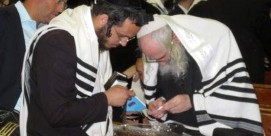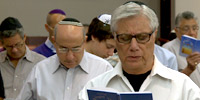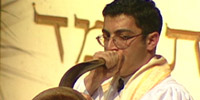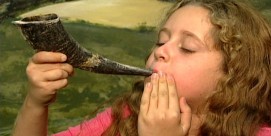BOB ABERNETHY: On the calendar this week are the Jewish High Holidays, a 10-day period of prayer and introspection beginning with Rosh Hashanah, the Jewish New Year 5761, and ending with Yom Kippur, the day of atonement. For new rabbis, the High Holidays have great meaning, significance, and stress. This is the time of year when synagogues have their greatest attendance. We spoke with Rabbis Deborah Wechsler and Robert Tobin, both of Chizuk Amuno congregation in Baltimore, Maryland, about the High Holidays and their preparation for them.
Please note, some Jews wear tefillin, part of which are small wooden boxes containing the Shema prayer, during the weekday morning prayer service.
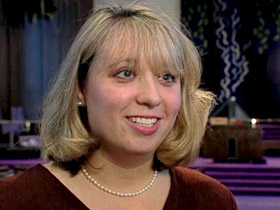
Rabbi DEBORAH WECHSLER (Chizuk Amuno Congregation): During the Jewish month preceding Rosh Hashanah is when we begin to examine ourselves and examine our deeds.
I'll tend to start out in the evening at the holidays by asking people to close their eyes and to reflect on the year, to think about a time that they danced at a wedding, a time that they wept at a funeral.
There's a tradition, that during the month before the holidays that you are supposed to contact, to call—now we have e-mail, so technology is a part of it—to get in touch with the people in your life that you may have hurt, that you may have wronged in some way, and to ask them for forgiveness, and it's a very powerful vehicle.
Rabbi ROBERT TOBIN (Chizuk Amuno Congregation): The shofar is a symbol of redemption. The shofar is used in our Torah, our Bible, as a symbol of God's presence calling out for human action.
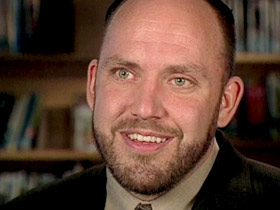
It's a wake up call to go back and to soul search, to look at what you've been and what you've done in a very personal way, in a very critical way, and to assess where you've made mistakes or hurt people. And to make amends for those, to truly make amends for those, so when we stand before God on Yom Kippur and we pray for forgiveness for those deeds and we pray with hope for a life of health and happiness and prosperity in the year to come that our slate is clean, so it's a washing of the slate every year.
Rabbi WECHSLER: It's always scary to get up in front of a group of people. And scary in the sense of an awesome responsibility to realize that for people this may be one of a few opportunities that you have to touch them and to connect with them.
Rabbi TOBIN: If they come away saying, gee, that was a great sermon, I failed. They need to come away saying, I think about something differently now.
Rabbi WECHSLER: Ideally, I think I would go away to the mountains, or the beach for a month and read and prepare and write and think. But the life of a Rabbi goes on as usual.
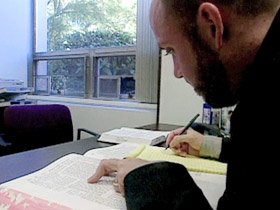
Rabbi TOBIN: And just because the holidays are coming doesn't mean we don't have shabbat, it doesn't mean we are not learning Hebrew, we're not learning the rest of Jewish history.
Rabbi WECHSLER: In addition to preparing sermons, there's everything else going on, I'm still teaching classes to the children, I'm still teaching the adults.
Rabbi TOBIN: Life doesn't stop just because we have this enormous observance coming around the corner.
Rabbi WECHSLER: That's where the pressure is to find something that is meaningful, to find what in the tradition will be meaningful to so many people and will be able to speak to them.
Rabbi TOBIN: That people have their lives fundamentally improved by their engagement with the synagogue, with God, with our tradition, if I can help that, then I've had a good day.
(to Rabbi Wechsler) Good luck.
Rabbi WECHSLER: You, too.




